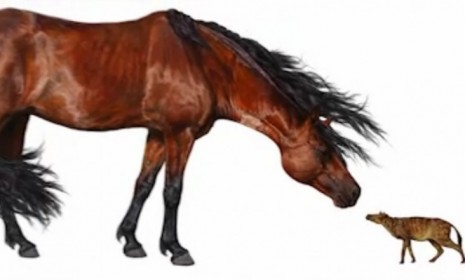Will global warming make us shorter?
To forecast the future of our overheated planet, scientists looked way back — to an ancient horse the size of a house cat

A free daily email with the biggest news stories of the day – and the best features from TheWeek.com
You are now subscribed
Your newsletter sign-up was successful
The size of mammals is directly linked to the planet's temperature, paleontologists say, and the hotter it gets, the smaller beasts become — suggesting that humans could shrink if the Earth continues its feverish course. Here's what you should know:
How did researchers reach this conclusion?
They studied Sifrhippus, a 56-million-year-old ancestor of the modern-day horse. Secretariat he was not: When Sifrhippus first cantered into existence, he weighed only 12 pounds. Researchers from Florida and Nebraska led a team that used the fossilized teeth of the Sifrhippus, which they dug up from the Bighorn Basin in Wyoming, to judge its size over time, which they then cross-referenced with global climate patterns.
The Week
Escape your echo chamber. Get the facts behind the news, plus analysis from multiple perspectives.

Sign up for The Week's Free Newsletters
From our morning news briefing to a weekly Good News Newsletter, get the best of The Week delivered directly to your inbox.
From our morning news briefing to a weekly Good News Newsletter, get the best of The Week delivered directly to your inbox.
What did the study show?
Over the course of a 175,000-year period, Sifrhippus shrank to about 8.5 pounds — the weight of an average cat — before beefing up to its original 12-pound size. The Alice-in-Wonderland change in size corresponded with a fluctuation in temperature, with the horse shrinking as the planet heated up by 9 to 18 degrees Fahrenheit, and growing as Earth cooled.
Why did heat cause the horse to shrink?
Scientists think that smaller animals, with a high surface area-to-volume ratio, can shed heat more easily and thus survive more successfully in warm climates. That would jive with a theory known as Bergmann's rule, which holds that animals of the same genus or species are typically smaller in warmer climates and larger in colder climates. (The polar bear, for example, is the largest member of the bear family.) Scientists also believe that global warming reduces the availability of food and saps its nutritional content, resulting in smaller creatures.
A free daily email with the biggest news stories of the day – and the best features from TheWeek.com
Could humans shrink, too?
Quite possibly. Some bird species have already grown more diminutive in recent decades. But scientists say a lot more research has to be done on how climate change affects modern animals, not just prehistoric ones, before drawing any definitive conclusions.
Sources: Bloomberg, Daily Mail, The New York Times, Scientific American
-
 Is Andrew’s arrest the end for the monarchy?
Is Andrew’s arrest the end for the monarchy?The King has distanced the Royal Family from his disgraced brother but a ‘fit of revolutionary disgust’ could still wipe them out
-
 Quiz of The Week: 14 – 20 February
Quiz of The Week: 14 – 20 FebruaryQuiz Have you been paying attention to The Week’s news?
-
 The Week Unwrapped: Do the Freemasons have too much sway in the police force?
The Week Unwrapped: Do the Freemasons have too much sway in the police force?Podcast Plus, what does the growing popularity of prediction markets mean for the future? And why are UK film and TV workers struggling?